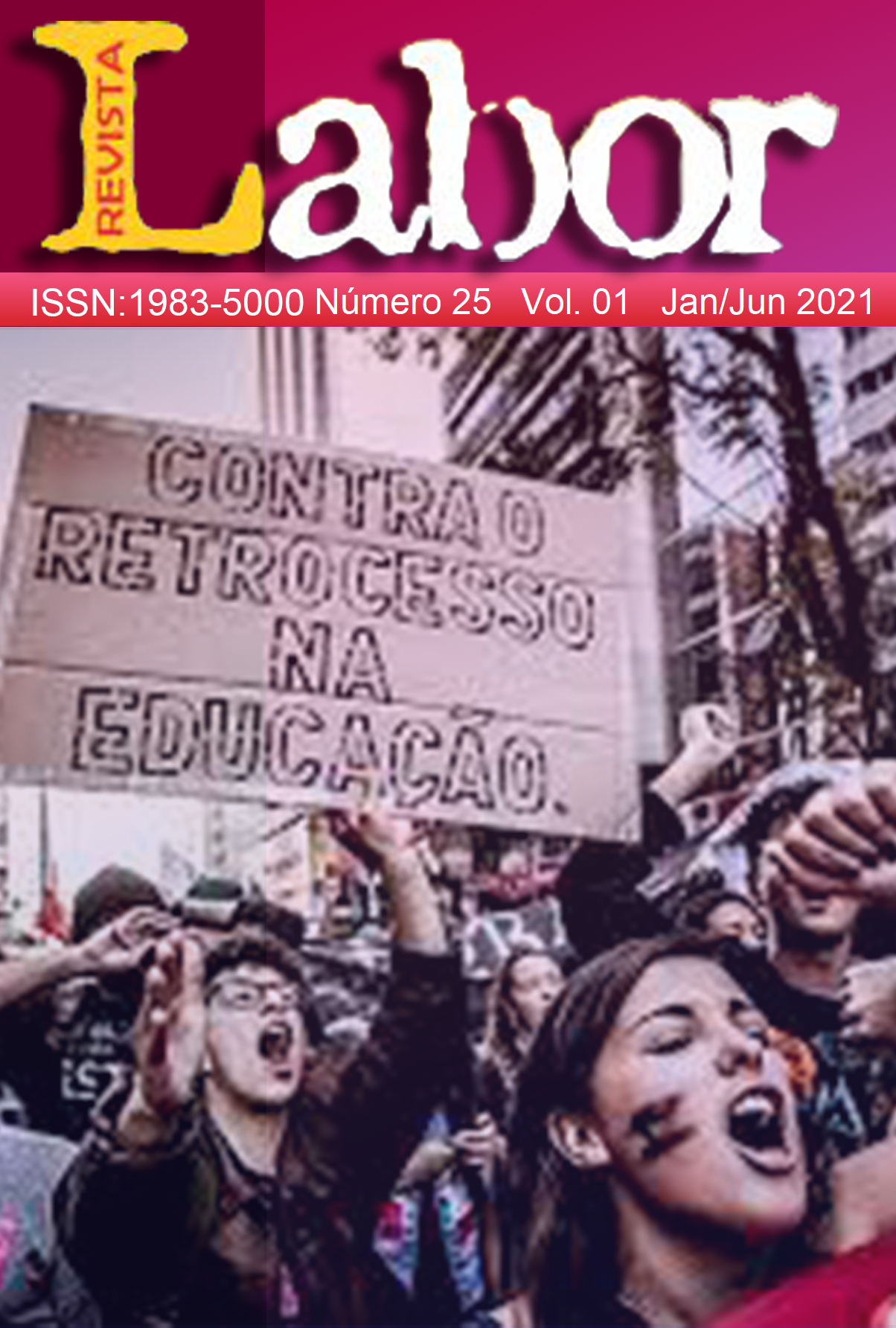Remembering to resist:
Specificity and interlocution of curricular policies for EJA and Professional Education
DOI:
https://doi.org/10.29148/labor.v1i25.60236Keywords:
Public policy. Professional education. Curriculum.Abstract
This article brings to mind an experience of municipal public policy on of professional Education integrated with Youth and Adult Education in the elementary school stage. The research aims to highlight the process of construction of local public policy, observing their curricular specificities and their approximation with the national policy of integral training of workers, from 2004 to 2016. The investigation is of a qualitative character, systematized in a profile of document study. In order to organize this methodology, there is a treatment of the profile of the municipal policy and there is an analysis of this experience in compliance with Decree 5154/04 and the Document of the National Program for the Integration of Professional Education with Basic Education in the Youth and Adult Education modality (PROEJA). Thus, the systematization started from the specific documents of the municipality under study and from the documents of the national policies mentioned. The reflection is based on the analysis of the categories integral training and work as an educational principle. The theoretical framework is affiliated with the concept of critical-humanistic education. The conclusion showed that the municipal policy was close to the national policy, as it presented a commitment to educating workers in an emancipatory perspective, based on the founding principles of integral training, besides, it elucidated their own paths, portraying curricular specificities that proposal of Professional Education of critical basis.
Downloads
References
DARDOT, Pierre; LAVAL, Christian. A nova razão do mundo: Ensaio sobre a sociedade neoliberal. São Paulo: Boitempo, 2016.
FREIRE, Paulo. Ação cultural para a liberdade. 6. ed. Rio de Janeiro: Paz e Terra, 1982.
___________. Pedagogia da Autonomia. 11. ed. Rio de Janeiro: Paz e Terra, 2010.
FRIGOTTO, G. (Org..) Educação e crise do trabalho: perspectivas de final de século. Petrópolis, RJ: Vozes, 1998.
LÖWY, M. Romantismo e messianismo: ensaios sobre Lukács e Benjamin. São Paulo: Perspectiva, 1990.
MARX, Karl e ENGELS, Frederic. Textos sobre Educação e Ensino. E-book. Campinas: Navegando Publicações, 2011. Disponível em: <https://www.marxists.org/portugues/marx/ano/mes/ensino.pdf>. Acesso em: 31 maio de 2019.
POULANTZAS, Nicos. O Estado, o poder, o socialismo. 2. Ed. Rio de Janeiro: Graal, 1985.
RAMOS, M. N. A pedagogia das competências: autonomia ou adaptação? São Paulo: Cortez, 2001.
____________. (Orgs.). Ensino médio integrado: concepção e contradições. São Paulo: Cortez, 2005.
SACRISTAN, José. G. O currículo: Uma reflexão sobre a prática. 3. ed. Porto Alegre: Artmed, 2008.
SALVADOR, A. D. Métodos e técnicas de pesquisa bibliográfica. Porto Alegre: Sulina, 1986.
SÃO BERNARDO DO CAMPO. Departamento de Ações Educacionais e Divisão de EJA e Educação Profissional. Catálogo de educação profissional Municipal. São Bernardo do Campo, SP: [s.n.], fev. 2014. 91 p.
SÃO BERNARDO DO CAMPO. Conselho Municipal de Educação. Deliberação de n. 2/10. Notícias do Município, São Bernardo do Campo, n. 76, 2010, p. 31.
SÃO BERNARDO DO CAMPO. Departamento de Ações Educacionais e Divisão de EJA e Educação Profissional. Diretrizes curriculares da EJA. São Bernardo do Campo, SP: [s.n.], jan. 2012. 122 p.
SAVIANI, Dermeval. A nova lei da educação: trajetória, limites e perspectivas. 5 ed. Campinas (SP): Autores Associados, 1999. (Coleção educação contemporânea)
VIDIGAL, Carmen Silva. Educação de jovens e adultos trabalhadores de qualidade: regime de colaboração e Sistema Nacional de Educação. Educação e Sociedade, in: https://www.scielo.br/scielo.php?script=sci_arttext&pid=S0101-73302013000300017&lng=pt&tlng=pt- vol.34 no.124 Campinas jul./set. 2013
Downloads
Published
How to Cite
Issue
Section
License
Autores que publicam nesta revista concordam com os seguintes termos:
1. Autores mantém os direitos autorais e concedem à revista o direito de primeira publicação, com o trabalho simultaneamente licenciado sob a Licença Creative Commons Attribution que permite o compartilhamento do trabalho com reconhecimento da autoria e publicação inicial nesta revista.
2. Autores têm autorização para assumir contratos adicionais separadamente, para distribuição não-exclusiva da versão do trabalho publicada nesta revista (ex.: publicar em repositório institucional ou como capítulo de livro), com reconhecimento de autoria e publicação inicial nesta revista.
3. Autores têm permissão e são estimulados a publicar e distribuir seu trabalho online (ex.: em repositórios institucionais ou na sua página pessoal) durante o processo editorial informando que o artigo está em processo de publicação, já que isso pode aumentar o impacto e a citação do trabalho publicado (Veja O Efeito do Acesso Livre).


